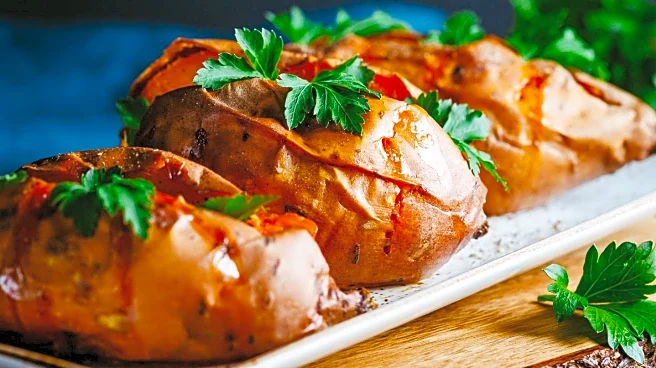What's Happening?
Robert Baker, a food science professor at Cornell University, created a barbecue chicken recipe over 75 years ago that remains popular today. Known as Cornell chicken, the recipe features a vinegar-based marinade that uses simple ingredients like apple cider vinegar, vegetable oil, poultry seasoning, and a beaten egg. This marinade transforms chicken into a dish that is crisp on the outside and tender on the inside. The recipe is versatile, suitable for cooking on a grill, in a skillet, or using an air fryer. Cornell chicken is particularly popular in upstate New York, where it is served at restaurants, family picnics, and food festivals.
Why It's Important?
The enduring popularity of Cornell chicken highlights the impact of simple, well-crafted recipes on American cuisine. It showcases how traditional cooking methods and basic ingredients can create dishes that stand the test of time. The recipe's success also reflects the cultural significance of barbecue in the U.S., particularly in the Northeast. It provides a historical perspective on American culinary practices and emphasizes the importance of flavor and technique over complexity. The continued enjoyment of Cornell chicken demonstrates the lasting appeal of comfort food and its role in community gatherings and celebrations.
What's Next?
As Cornell chicken continues to be a favorite, it may inspire new culinary innovations and adaptations. Chefs and home cooks might experiment with variations of the recipe, incorporating different spices or cooking methods. The recipe's simplicity allows for easy adaptation, potentially leading to new interpretations that could gain popularity. Additionally, the recipe's historical roots may encourage interest in other traditional American dishes, fostering a deeper appreciation for culinary heritage. The ongoing popularity of Cornell chicken could also influence food festivals and events, where it might be featured as a classic dish.
Beyond the Headlines
Cornell chicken's success underscores the importance of preserving culinary traditions and the role of academia in influencing food culture. Robert Baker's contribution to American cuisine through his research and recipe development highlights the intersection of science and cooking. The recipe's simplicity and effectiveness demonstrate how academic insights can lead to practical applications in everyday life. Furthermore, the dish's popularity in community settings reflects the social and cultural dimensions of food, emphasizing its role in bringing people together and creating shared experiences.









